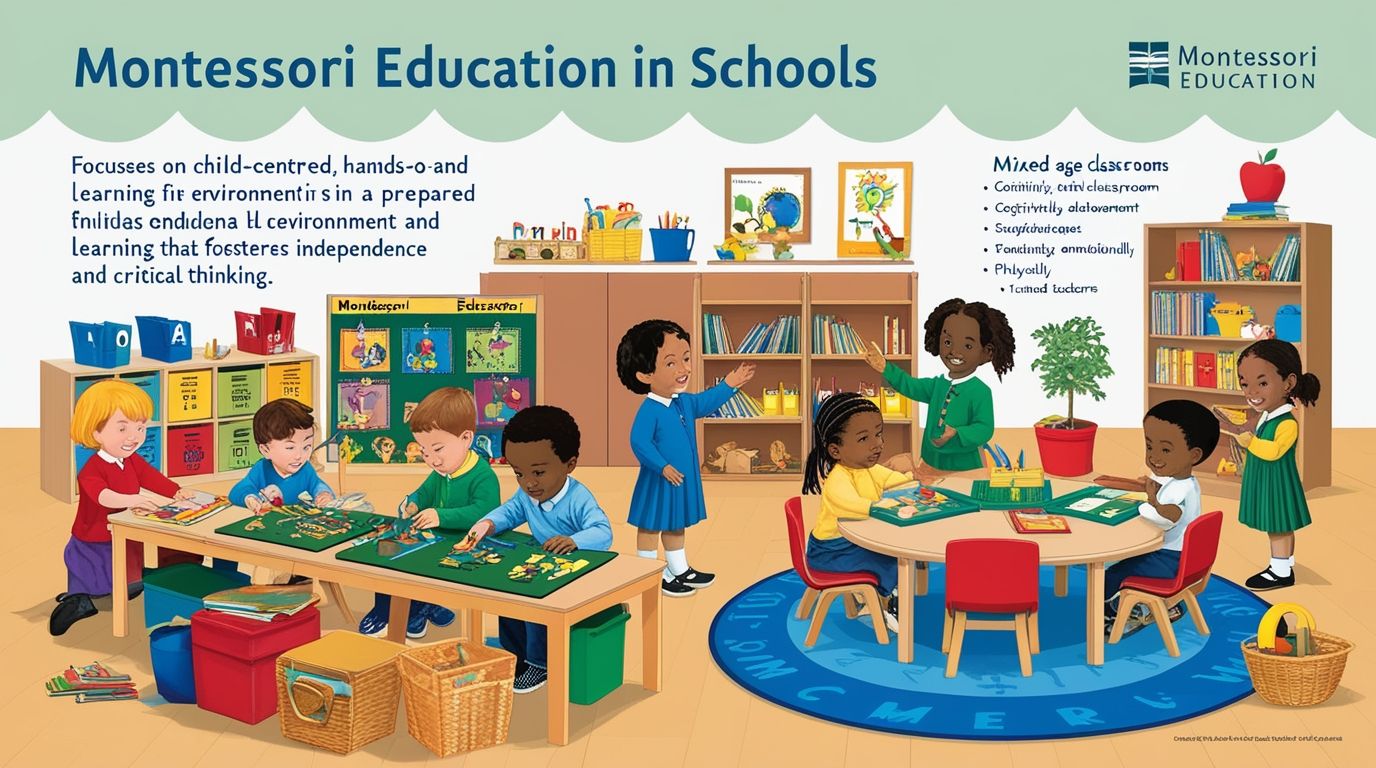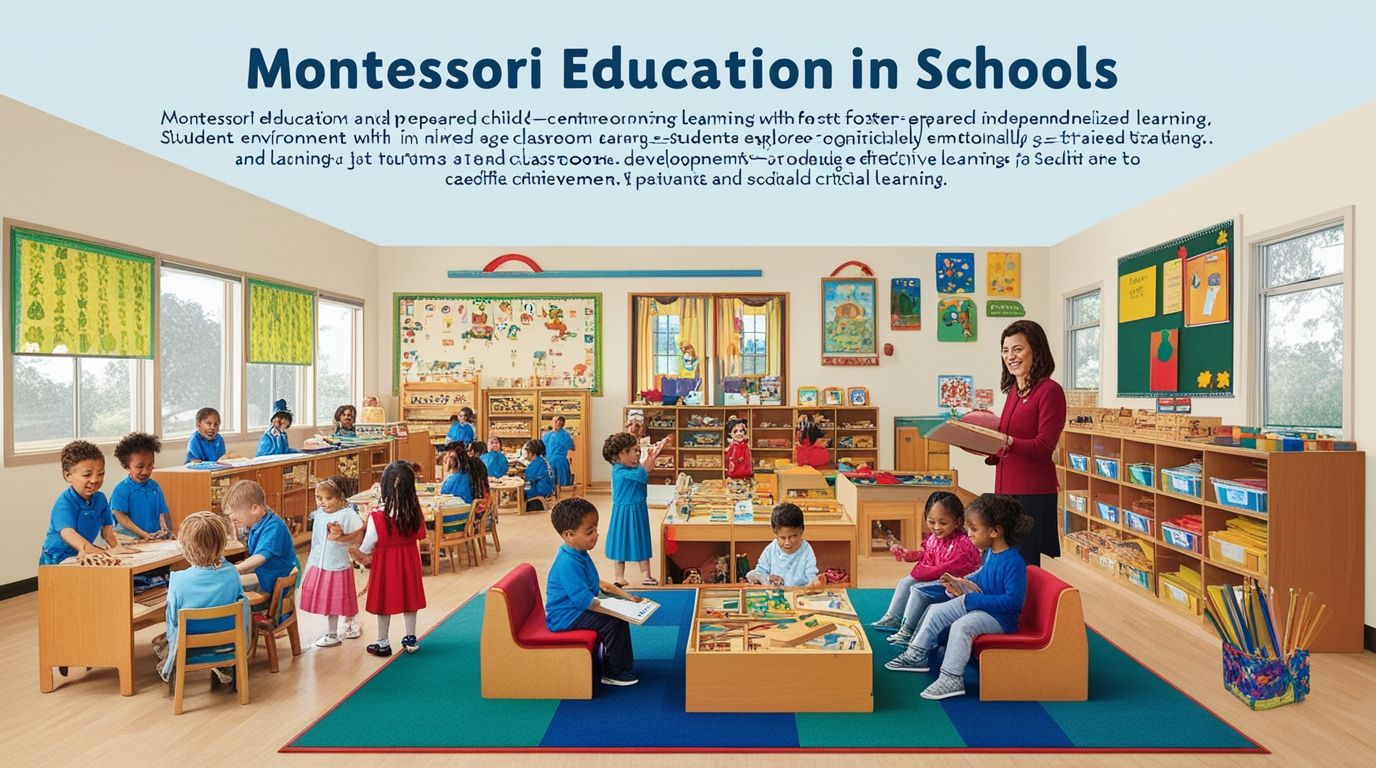Montessori Education in Schools, developed by Dr. Maria Montessori in the early 20th century, is an educational philosophy and practice that emphasizes self-directed learning, mixed-age classrooms, and hands-on learning. It stands in contrast to traditional educational models by focusing on the development of the whole child—cognitively, socially, emotionally, and physically. Montessori education has gained popularity worldwide and is implemented in many schools, both public and private. This article provides an in-depth exploration of Montessori education in schools, highlighting its principles, benefits, challenges, and impact on students.
1. Principles of Montessori Education
- Child-Centered Learning: At the heart of Montessori education is the belief that children are naturally curious and capable of initiating learning in a supportive and thoughtfully prepared environment. The teacher’s role is to guide rather than instruct, allowing children to explore and learn at their own pace.
- Prepared Environment: Montessori classrooms are designed to be aesthetically pleasing, organized, and filled with materials that invite exploration. The environment is carefully prepared to support independent learning, with materials accessible to children, promoting self-directed activity.
- Mixed-Age Classrooms: Montessori schools typically group children in mixed-age classrooms, usually spanning three years. This structure allows younger children to learn from older peers and older children to reinforce their knowledge by teaching concepts they have already mastered.
- Hands-On Learning: Montessori education emphasizes learning through doing. Students use specially designed educational materials that encourage them to engage all their senses in the learning process. These materials are self-correcting, enabling students to identify and correct their mistakes independently.
- Respect for the Child: Montessori education fosters respect for each child’s individuality. Teachers observe students and tailor the learning experience to meet each child’s unique needs, strengths, and interests.
- Development of Independence: Montessori education aims to develop independent learners. Children are encouraged to make choices, take responsibility for their actions, and develop problem-solving skills.
2. Implementation in Schools
- Montessori Schools: Montessori education is implemented in various school settings, including public, private, and charter schools. Montessori schools may follow a strict adherence to Montessori principles or incorporate them into a more traditional curriculum.
- Teacher Training: Montessori teachers undergo specialized training to understand the philosophy and effectively use Montessori materials. Teacher training programs are rigorous and often involve both theoretical study and practical experience.
- Curriculum and Assessment: The Montessori curriculum is broad, encompassing subjects such as language, mathematics, science, social studies, art, and practical life skills. Unlike traditional education systems that rely heavily on standardized testing, Montessori schools use observational assessments to track student progress. Teachers observe students’ work and interactions, noting their development and adjusting lessons accordingly.
- Daily Schedule: A typical Montessori school day is structured yet flexible. Children often have uninterrupted work periods, allowing them to delve deeply into tasks without the constraint of a rigid timetable. This uninterrupted time supports concentration and the ability to work at one’s own pace.

3. Benefits of Montessori Education
- Fostering Independence: Montessori education is renowned for fostering independence in children. The focus on self-directed learning and decision-making helps children develop confidence and self-esteem.
- Encouraging a Love of Learning: Montessori education nurtures a love of learning by allowing children to explore subjects that interest them. The hands-on, experiential nature of Montessori materials engages children in a way that traditional education methods may not.
- Holistic Development: Montessori education addresses the whole child, supporting cognitive, social, emotional, and physical development. The emphasis on social skills, empathy, and collaboration prepares children for both academic success and life beyond the classroom.
- Personalized Learning: Montessori education’s individualized approach allows children to progress at their own pace. This personalized learning experience ensures that children who may need more time to master a concept are not rushed, while those who grasp concepts quickly are not held back.
- Development of Critical Thinking Skills: Montessori education encourages critical thinking and problem-solving. The use of self-correcting materials and the emphasis on understanding rather than rote memorization helps students develop the ability to think independently.
4. Challenges of Montessori Education
- Misconceptions: Despite its benefits, Montessori education is sometimes misunderstood. Some parents and educators mistakenly believe that Montessori classrooms are unstructured or lack discipline. In reality, Montessori environments are carefully organized to balance freedom with responsibility.
- Cost and Accessibility: Montessori education can be expensive, particularly in private schools where tuition fees may be high. This cost barrier can limit access to Montessori education for families from lower socioeconomic backgrounds. While public Montessori schools exist, they are less common and often have long waiting lists.
- Standardization and Testing: The Montessori approach’s emphasis on observational assessment rather than standardized testing can be a challenge in education systems that prioritize test scores. Montessori schools may face pressure to conform to state or national standards, potentially compromising the integrity of the Montessori method.
- Teacher Training and Availability: The rigorous training required for Montessori teachers means that there is often a limited pool of qualified educators. This shortage can make it difficult for schools to fully implement Montessori principles or expand their Montessori programs.
5. Impact on Students
- Academic Achievement: Research on Montessori education has shown positive outcomes for students, particularly in terms of academic achievement. Studies have found that Montessori students often outperform their peers in traditional schools in areas such as reading, mathematics, and problem-solving skills.
- Social and Emotional Development: Montessori education’s emphasis on social skills, empathy, and collaboration fosters strong social and emotional development. Students learn to work collaboratively, resolve conflicts peacefully, and respect others’ differences.
- Long-Term Benefits: The skills and attitudes developed in Montessori schools—such as independence, critical thinking, and a love of learning—have long-term benefits. Montessori students often continue to excel academically and socially in later stages of their education and beyond.
6. Case Studies and Examples
- Public Montessori Schools: Several public Montessori schools in the United States and other countries have demonstrated the effectiveness of the Montessori approach in diverse settings. These schools often serve a broad demographic and show that Montessori education can be successfully integrated into public education systems.
- Global Impact: Montessori education has a global reach, with schools in countries around the world. The adaptability of the Montessori method to different cultural contexts speaks to its universal appeal and effectiveness.
7. Conclusion
Montessori education in schools offers a unique and effective approach to learning that emphasizes the development of the whole child. Its principles of child-centered learning, respect for the individual, and hands-on experience have been proven to foster independence, critical thinking, and a lifelong love of learning. While there are challenges in implementing Montessori education, particularly in terms of cost, accessibility, and alignment with standardized testing, the benefits for students are clear. As education continues to evolve, the Montessori method remains a valuable and relevant model for fostering the next generation of learners.
By embracing the core tenets of Montessori education, schools can create environments that support holistic development, preparing students not only for academic success but for life as capable, responsible, and compassionate individuals. The Montessori approach’s enduring relevance and impact on students make it a compelling choice for educators and parents seeking an alternative to traditional educational models.

6 thoughts on “Montessori Education in Schools”
Comments are closed.